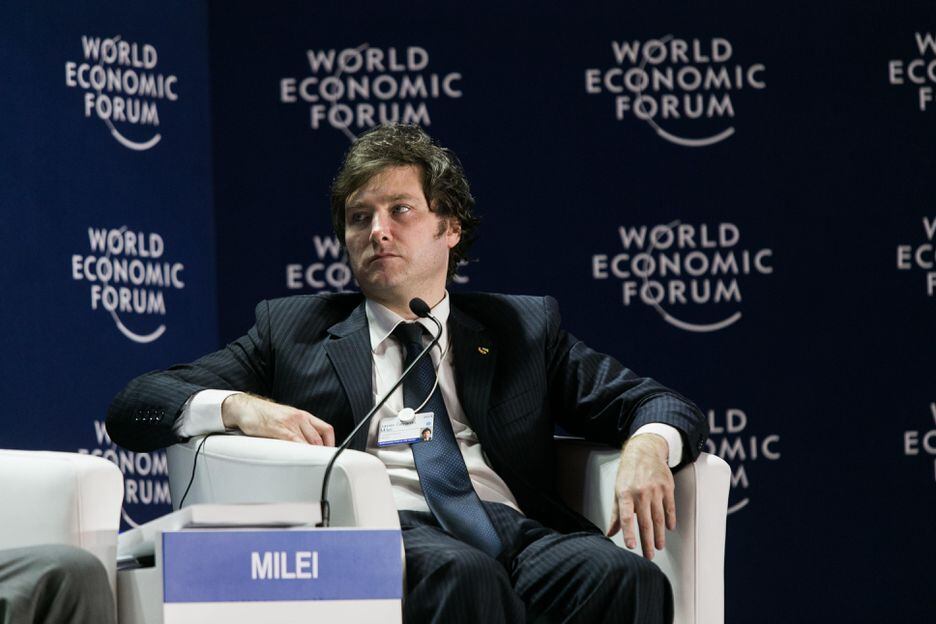
Published 01/16/2024 09:20 | Edited 01/16/2024 09:32
Argentine President Javier Milei is expected, this Wednesday (17), to present at the World Economic Forum in Davos, Switzerland, his ultra-liberal plan for deregulation of the State amidst the world elite’s suspicions regarding childish radicalism, such as privatizing the Bank Central and dollarize the economy.
Milei’s speech in the Alps coincides with two vexing marks on the economy in less than two months of the new government: this week, Argentine inflation for the month of December confirmed the biggest monthly increase since 1991, closing at 25.5%.
In November, the last month of Alberto Fernández’s administration, inflation reached 12.8%. The spike is a direct consequence of a series of measures taken by Javier Milei’s government, which deregulated a series of economic rules that protected the population’s purchasing power.
This Monday (15), the new bus and train fares came into effect in the metropolitan region of Buenos Aires. Both had an increase of 45%, following an agreement between the government and the employers’ associations that provide these services.
Read also: Honeymoon with Milei turns sour due to lack of a clear economic plan
The metropolitan region of the Argentine capital is home to around 15 million people (around 35% of the country’s population) who use public transport to get around the neighborhoods and regions of Buenos Aires.
Argentina’s Ministry of Infrastructure announced that train and bus fares will be readjusted monthly according to inflation, different from what occurred under the government of former president Alberto Fernández, who sought to establish price freezes for some essential services to maintain power. of purchasing by the country’s population, especially the poorest.
The Argentine delegation took off from Buenos Aires on Monday afternoon (15) and has its first agenda, later this Tuesday (16), in Davos, with the director general of the International Monetary Fund (IMF), Kristalina Georgieva.
Last week, the Argentine government won a “vote of confidence” from the IMF, after announcing the drastic austerity program shortly after taking office. On the 10th, Georgieva approved a review of the country’s current US$44 billion agreement, which could unlock a disbursement of US$4.7 billion.
To achieve this, Argentina must reach a surplus of 2% of GDP in 2024 and reach US$10 billion in net reserves at the end of 2024. The new agreement will still have to be approved by the body’s board to unlock the new billion-dollar loan.
Argentina’s new goals agreed with the IMF will only be possible with the imposition of a strong constraint not only on the government’s social programs, but also on the productive sectors.
For Fernando Morra, deputy minister of Economy in Alberto Fernández’s government, to produce the primary surplus, Milei’s ultra-right government will have to seek a very strong adjustment of public accounts without worrying about social balance.
“It is an attempt to organize public accounts and external accounts without taking into account the impact of this in social terms”, he said.
The director of the General Confederation of Small and Medium-sized Companies, Mauro González, highlighted in a publication on X, formerly Twiiter, that the adjustments at the expense of workers should impact consumption and national production.
“As long as government adjustments are made at the expense of workers and small entrepreneurs, the consequences for national production will be tragic. What is expected with the end of development programs is a drop in consumption, growth in unemployment, flat wages and no measures to reactivate the economy. The fiscal surplus in exchange for the closure of SMEs is dangerous,” he said.
Read also: Argentine court suspends Milei’s labor reform in union victory
The president of Argentina is scheduled to speak in Davos this Wednesday (17) in the presence of the founder of the Forum, Klaus Schwab.
According to Clarinduring the 30 minutes of presentation, Mieli must emphasize the “benefits of libertarian principles”, in addition to stating that Argentina is determined to become a priority partner of democratic and liberal states, which seek a Mercosur agreement with the European Union .
Source: vermelho.org.br

